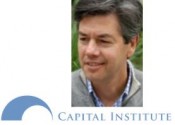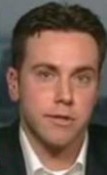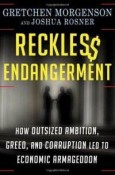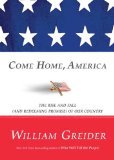Q&A: JOHN FULLERTON – Former Managing Director at JPMorgan & Founding Director, THE CAPITAL INSTITUTE
Written on September 18th, 2014 |
Aired 06/24/12
JOHN FULLERTON has spent a career at the highest reaches of the financial world, including as chief investment officer of a division of JP Morgan.
He is the founder and director of Capital Institute, which describes itself as “a non-partisan, transdisciplinary collaborative space, whose mission is to explore and effect economic transition to a more just, resilient, and sustainable way of living on this earth through the transformation of finance.” That’s a big, bold, and daunting mission and I’m eager to learn how they plan to do that and a sense of their progress so far.
JOHN FULLERTON is also principal of Level 3 Capital Advisors, LLC. whose investments are primarily focused on sustainable, regenerative land use, and food, and water issues. Fullerton is the creator of the weekly Blog, “The Future of Finance” on the Capital Institute
Q&A: ROBERT JOHNSON, (INET)
Written on September 9th, 2014 |
Q&A: David DeGraw – Occupy/99%
Written on June 20th, 2012 |
Aired 06/17/12
DAVID DeGRAW, who a year ago was among a handful who called for the 99% to rise up. On June 14th, Flag Day, last year, Anonymous and the 99% Movement launched a collaborative effort to announce the birth of a “decentralized non-violent resistance movement to end the system of political bribery and break up the big banks centered at the Federal Reserve.” This morphed into Occupy Wall Street, and we will talk about one of the newest incarnations of that effort.
DAVID DeGRAW. David is founder and editor of http://ampedstatus.com/, formerly editorial director of http://mediachannel.org/, and author of The Economic Elite Vs The People of the United States. He is one of the early leaders of the the Occupy/99% movement and one of the founders of http://moneyoutpack.org/
Q&A: GRETCHEN MORGENSON – 2002 Pulitzer Prize winner
Written on July 3rd, 2011 |
Aired 06/26/11
GRETCHEN MORGENSON was awarded the Pulitzer Prize in 2002 for her "trenchant and incisive" coverage of Wall Street. She has been on that beat ever since and now has a book on the recent meltdown. Though we've had in depth conversations with Michael Lewis, Joseph Stiglitz, Simon Johnson, William Greider and others about the crisis, it's been a while since we covered it, and so this week we will have a chance to get an update on where things stand and look at some of the implications.
RECKLESS ENDANGERMENT lays out how the financial meltdown resulted from the toxic interplay of Washington, Wall Street, and corrupt mortgage lenders. It reveals how the watchdogs who were supposed to protect us from financial harm were actually complicit in creating the financial crisis, and focuses on the abuse of Fannie May and Freddie Mac.
http://www.nytimes.com/
Q&A: WILLIAM GREIDER – national affairs, The Nation magazine, author – Come Home America
Written on March 24th, 2010 |
Aired 03/21/10
I've been trying to book William Greider ever since I read an article of his last August about restructuring the Federal Reserve. For some, the Fed is the at the center of all that ails us. For others, it is the right place to house any new financial regulatory powers we might gain as a result of the current crisis.
There are now 32 co-sponsors for S604 in the Senate and 317 for HR1207 in the House for bills to audit the Federal Reserve, and 95,000 have signed a petition at http://www.auditthefed.com/
Just yesterday The U.S. Court of Appeals for the Second Circuit in New York ruled the Federal Reserve must disclose the names of banks that could have collapsed if they had not received emergency loans.
Greider wrote perhaps the finest book on the Federal Reserve and always seems to keep an eye on its secretive and too powerful ways. He challenged Greenspan and Paulson long before it was fashionable. And he was right.
We'll focus on the Fed and deal with other economic and political issues if we have time.
